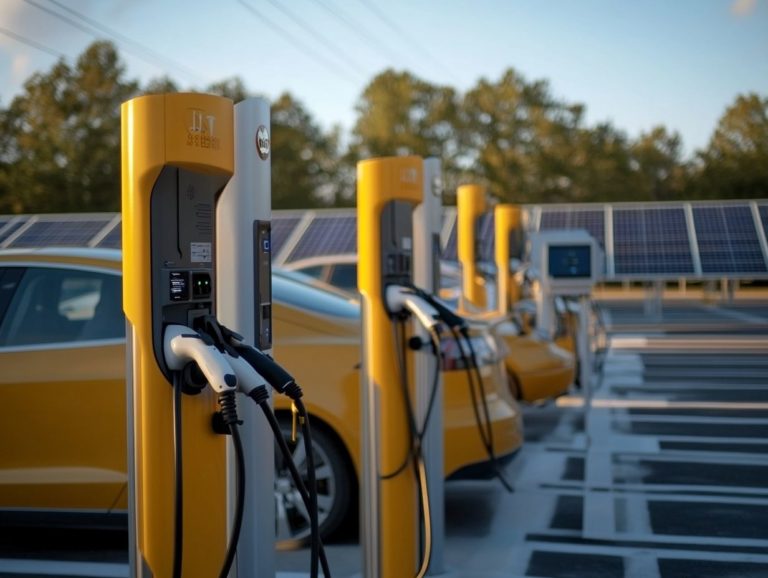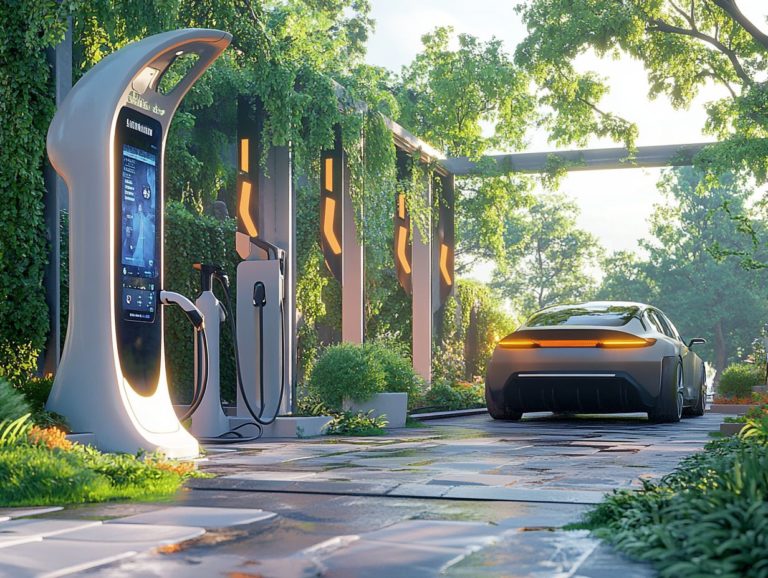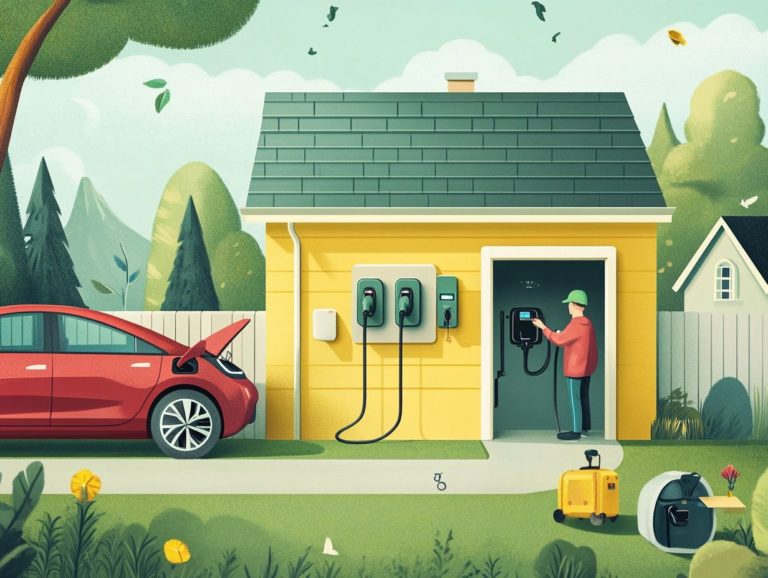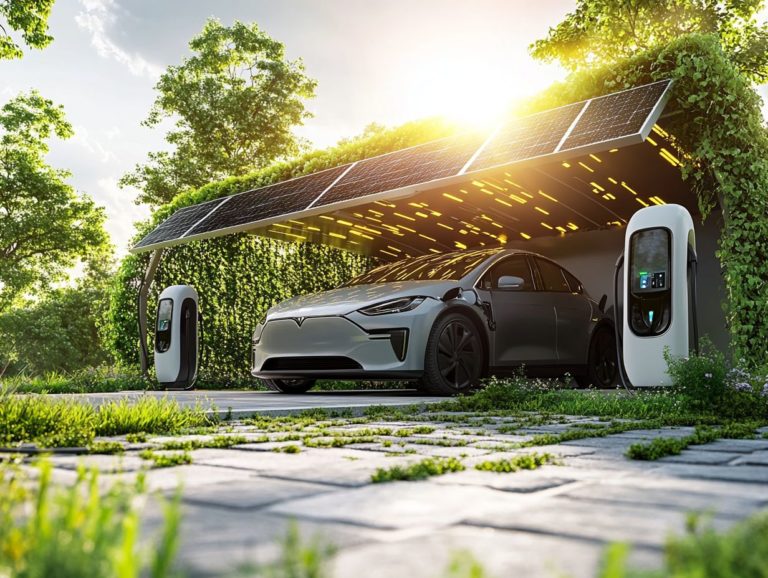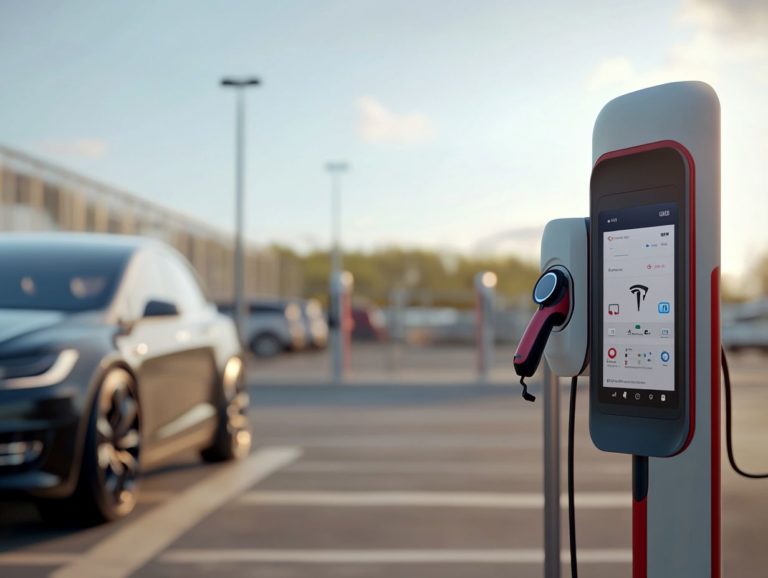the impact of charging speed on ev battery life
Electric vehicles (EVs) are revolutionizing your approach to transportation! However, one crucial element often slips under the radar: battery life.
Grasping how various factors influence the longevity of your EV battery empowers you to make well-informed choices for your vehicle. From charging speed to the different charging methods available, every aspect contributes to the overall health of your battery.
This article delves into the intricacies of EV battery life, highlighting the potential downsides of fast charging. It also offers practical tips to extend your battery s lifespan. Immerse yourself in this exploration to discover how to maximize your EV experience!
Contents
Key Takeaways:
Fast charging can negatively impact EV battery life and reduce its overall lifespan. Act now to protect your battery’s health!
Charging speed, measured in kilowatts (kW), varies based on the charging method. Understanding these points will help you make smarter charging decisions!
To maximize EV battery life, consider using slower charging methods and implementing strategies such as avoiding full charges and limiting exposure to extreme temperatures.
What is EV Battery Life?
EV battery life refers to how long and well the lithium-ion batteries powering electric vehicles operate. This lifespan depends on key factors you can control!
Your charging practices, battery management system, and driving habits all influence your vehicle s performance and range. Understanding these nuances is essential for consumers and manufacturers alike.
The significance of EV battery life is paramount; it directly affects the viability of electric mobility and shapes consumer confidence in these cutting-edge vehicles. For instance, battery capacity indicates how much energy the battery can store.
Charging habits whether you frequently use fast chargers or prefer overnight charging are equally influential. Driving conditions such as steep terrains or aggressive acceleration can drain your battery faster.
By thoroughly understanding these elements, you can enhance your vehicle’s performance and contribute to a more sustainable environment.
Factors Affecting EV Battery Life
Multiple key factors influence your EV battery’s lifespan. These include:
- Battery degradation
- Effective thermal management (how heat is controlled and maintained)
- Charging efficiency
- Your charging habits
Charging Speed and Its Impact
Charging speed is pivotal to the overall health and longevity of your EV batteries. Fast charging can significantly affect the battery’s state of charge and performance over time.
While fast charging offers convenience, it can increase temperature and stress on the battery cells. Standard charging rates take a more measured approach, fostering a stable thermal environment that helps maintain battery health.
Many electric vehicles are equipped with advanced battery management systems that actively monitor and regulate temperature and charge levels. These systems mitigate potential issues from rapid charging, ensuring a balance between charging speed, battery longevity, and overall vehicle range.
This balance safeguards your battery’s health and enhances your driving experience.
Other Factors to Consider
Besides charging speed, other factors such as battery chemistry, temperature, and charging practices significantly impact your EV battery’s performance and lifespan.
Understanding how these elements work together is essential for electric vehicle users. Battery chemistry, whether lithium-ion or solid-state variations, dictates energy density and stability.
Temperature fluctuations can either boost or hinder battery efficiency. Operating in extreme heat or cold can degrade performance and shorten lifespan, making it vital to maintain an optimal thermal environment.
Improper charging practices like using incompatible chargers or neglecting to let the battery cool before rapid charging can accelerate degradation. By following recommended guidelines, you extend battery longevity and ensure consistent performance, ultimately enhancing your driving experience.
Understanding Charging Speed
Grasping the nuances of charging speed is crucial for electric vehicle owners. It involves familiarizing yourself with various charging methods, including DC fast charging, which allows quick recharges, and Level 2 charging, ideal for home use.
Different Types of Charging
The world of charging electric vehicles is diverse, featuring options like Level 2 charging for home use and DC fast charging for those on the go.
Level 2 charging operates at 240 volts. It provides a substantial charge over several hours perfect for overnight charging in the comfort of your own home. This method is economical and incredibly convenient, especially for those who typically drive shorter distances each day.
DC fast charging, on the other hand, is essential for long-distance journeys. This method operates at much higher voltages and can replenish your EV’s battery to about 80% in as little as 30 minutes. However, it s less common and can be more expensive.
The effectiveness of these charging methods is bolstered by an expanding infrastructure that includes home chargers, public airports, and highway rest stops. This robust network facilitates seamless travel and enhances the usability of electric vehicles.
Adequate infrastructure is crucial, ensuring you can easily locate and utilize charging stations wherever your journey takes you.
How Charging Speed is Measured
Charging speed is typically measured in kilowatts (kW). This indicates how swiftly energy travels to your electric vehicle’s battery and influences its state of charge. This measurement is essential as it directly impacts the charging rates your vehicle can achieve, giving you a clear idea of how soon you’ll be back on the road.
Battery management systems (BMS) play a crucial role in overseeing these charging processes, ensuring that your batteries are charged efficiently and safely. They meticulously monitor voltages, temperatures, and other key parameters to optimize charging efficiency, ultimately enhancing the battery s lifespan.
When you manage charging speed and efficiency effectively, you enjoy faster charging times while supporting the long-term health and performance of your battery. Understanding these dynamics is fundamental for maximizing your electric vehicle experience.
Effects of Fast Charging on EV Battery Life
Fast charging presents a dual-edged sword for your EV battery life. On one hand, it offers remarkable convenience, allowing you to swiftly recharge and get back on the road. On the other hand, this convenience comes with notable risks, including potential battery degradation and adverse impacts on your vehicle’s overall performance.
Potential Negative Effects
The potential downsides of fast charging are worth considering, especially regarding battery health. Rapid charging can lead to increased battery degradation due to heat generation, adversely impacting your vehicle’s range and performance.
When you utilize rapid charging, excessive heat can build up within the battery cells. This thermal stress accelerates the chemical reactions that cause wear and tear and disrupts the battery’s chemistry, reducing its ability to hold a charge.
As a result, you might notice a decline in charging efficiency, with your batteries struggling to reach their optimal capacity. This degradation often translates into a shorter driving range, prompting you to rethink your charging habits and consider the long-term consequences of relying on fast charging stations frequently.
Mitigating Strategies
You can supercharge your battery’s performance with some smart strategies! To mitigate the negative effects of fast charging, adopt effective techniques such as keeping the battery cool and optimizing your charging habits, all backed by a robust battery management system.
By implementing precise cooling techniques, you can significantly boost your vehicle’s battery performance. This means monitoring the battery temperature to ensure it stays within the ideal range, preventing overheating during rapid charging sessions. Utilizing external cooling systems or passive cooling materials helps regulate heat buildup.
When you combine this with diligent charging practices like avoiding complete discharge and keeping your charge level between 20% and 80% you ll create a harmonious approach that enhances battery longevity.
Take action today to maximize your battery s lifespan! As you integrate these essential strategies into your routine, you’ll not only notice an increase in battery lifespan but also enjoy a more reliable driving experience.
Maximizing EV Battery Life
To maximize EV battery life, you need a strategic approach to your charging practices and maintenance. This thoughtful attention can significantly enhance battery health and overall performance, ensuring you get the most out of your electric vehicle.
Tips for Prolonging Battery Life
To prolong the life of your electric vehicle battery, focus on maintaining optimal charging efficiency and monitoring the state of charge. Understanding how battery chemistry and temperature affect performance is also essential.
By taking a few straightforward yet effective actions, you can significantly impact your battery’s longevity. For instance, regularly checking the settings on your charging station helps maximize efficiency and minimize energy loss.
Utilizing primarily Level 2 chargers for your routine charging needs strikes a perfect balance between speed and thermal management, reducing stress on the battery.
Avoid letting your charge levels dip below 20% too often, and refrain from charging above 80%. This habit keeps your battery healthy and ready to go!
Implementing these strategies not only optimizes performance but also extends the overall lifespan of your electric vehicle s battery.
Frequently Asked Questions
What is the impact of charging speed on EV battery life?
The charging speed refers to how quickly an electric vehicle’s battery is charged, which can affect its overall lifespan and performance. Charging an EV battery too quickly can lead to increased stress and temperature, potentially shortening its lifespan. Conversely, slow charging can reduce driving range and may be inconvenient for users.
What is considered fast charging for an EV battery?
Fast charging usually means using a station that can charge your car at 50 kW or faster. This significantly reduces charging time compared to standard chargers.
Can fast charging damage an EV battery?
Yes, frequent fast charging can harm your EV battery, particularly if the battery isn’t designed for high charging rates. Always follow the manufacturer’s recommended charging guidelines to avoid damage.
Are there any benefits to slow charging an EV battery?
Slow charging can reduce stress on the battery and result in a longer lifespan. It can also be more cost-effective and convenient for users with access to slower charging options at home.
How can I optimize charging speed for EV batteries?
One way to optimize charging speed is to use a charging station with adjustable rates, allowing you to select a slower or faster charging option based on your needs. Additionally, charge during off-peak hours when electricity rates may be lower and the process could be more efficient.
For more information on enhancing your EV battery care, check out our additional resources. Try these tips and share your experiences with battery maintenance!


